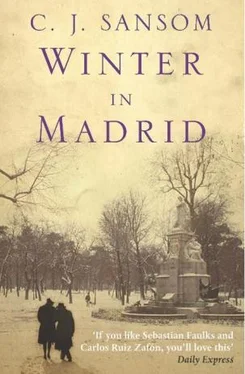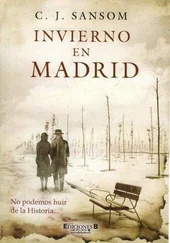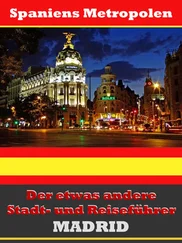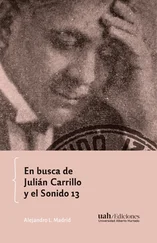‘Still working with the refugees?’ Harry asked her.
‘Yes. It’s mostly academics now, the resistance is pretty well beaten. I’m teaching a writer from Madrid English at the moment.’ She glanced at him. ‘Any news of Enrique and Paco?’
Harry’s face softened into a smile. ‘I had a letter last month, I don’t hear so often now. Paco’s starting work labouring for a local farmer.’
‘How old is he now?’
‘Sixteen. I never thought he’d make it but he has. Enrique says he still doesn’t talk much, but he enjoys working.’
‘Enrique saved him.’
‘Yes.’
After the massacre Barbara and Bernie and Harry had been bundled out of Spain on the first plane. As soon as they were back in England Harry had written to Enrique; he did not even know if Sofia’s brother had been told what had happened to her. A few weeks later a reply came from Asturias, in the north of Spain: the guardias had come to tell Enrique Sofia was dead and that night Enrique had packed a couple of suitcases, taken Paco to the station and caught a train to the north. He had thrown himself on the mercy of distant relatives who kept a small farm near Palencia. They had taken them in and Enrique and Paco had been there ever since. Harry sent them money every so often. They barely scratched a living but Enrique said the countryside was peaceful and quiet and that was what Paco had needed. He was better, though Enrique thought he would never leave the village. He had escaped the orphanage, unlike Carmela Mera. Carmela would be in her late teens now, Barbara thought. If she had lived. It was one of the things she tried not to think about. She shook her head to clear it.
‘It’s a shame to let the language go,’ she told Harry. ‘You should get some practice.’
‘Oh, I’m happy enough just doing French.’ He gave her a sad tight smile. ‘I had to let a lot of things go when they wouldn’t take me back at Cambridge.’
‘That was so unfair.’
‘Hoare’s revenge,’ Harry said flatly. ‘They were crying out for Fellows back then.’
‘Yes. And they didn’t like Bernie trying to get the papers to publish the truth about the Spanish camps.’
‘He was naive. He should have known they’d put a D-notice on the story.’
‘Have you thought of trying again? I mean, it’s been nearly seven years.’ Barbara hesitated. ‘I don’t think they’re keeping tabs on me any more.’ For years after she returned she noticed her mail had been opened, the flaps stuck down crudely, and sometimes there were strange noises on her telephone. Harry had experienced the same things.
‘Will says once you’re on a blacklist you stay on it.’ He paused. ‘Besides, I’m happy enough at Haverstock.’
‘I sometimes wonder,’ she said, and then paused.
‘What?’
‘Seeing the new war memorial there reminded me. I wonder if Bernie’s name is on the memorial at Rookwood.’
Bernie had been called up in 1943, after he was certified fit. With all his injuries he could probably have got out of it but he didn’t try, he wanted to fight fascism again. He had died on D-Day, the sixth of June 1944, shot down as he struggled ashore on Juno beach. In the car on the way to Madrid he had told Barbara he would never leave her again, but he had. She saw now that a man like him, in the times they lived in, would always go to fight. But she still longed for him, and for the child they had never had.
‘Did you see Hoare’s published his memoirs?’ Harry asked.
‘Has he?’
‘Viscount Templewood now, of course.’ Harry laughed bitterly. ‘Ambassador on Special Mission. He says Franco stayed out of the war entirely because of his own firm diplomacy. No mention of Hillgarth, of course. Memoirs of the pink rat.’
They reached the pub, a large place that served lunches. It was full of salesmen. As he led Barbara to a table Harry nodded to a couple of people at the bar.
‘The food’s not bad. When do you have to be at the airport?’
‘Not until four. Oodles of time.’
They ordered steak and kidney pudding. It was overcooked and gristly but Harry didn’t seem to mind.
‘So work’s keeping you busy?’ he asked.
‘Yes, work and the refugees.’
She studied him; he had a nasty shaving cut on his chin. ‘What do you do these days, apart from teaching? What happened with that woman teacher you got friendly with?’
He shrugged. ‘Oh, that fizzled out. I don’t do much really, apart from teach.’
‘Work’s my life too, I suppose. And the refugees. I thought I might do a part-time degree in Spanish.’
Harry nodded. ‘Good idea. You’d probably find it easy.’
‘I’d have to cut back on the refugee work.’ She laughed. ‘I’ve ended up one of those do-gooding single women. I always thought I would.’
‘I suppose at least we’ve got memories,’ Harry said, but his eyes were bleak. He smiled tightly again. ‘I’m thinking of giving up my digs and living in at Haverstock. Will’s son’s at Haverstock now, you know. Ronnie. Bright lad. Coming up to the sixth form. Looks like his dad. They couldn’t afford the Rookwood fees in the end.’
‘Are Will and Muriel still in Italy?’
‘Yes. I miss Will, especially since Uncle James died.’ That tight smile again. ‘Muriel hates it. Rome’s too hot and dusty for her, she wants a Paris posting.’
Barbara pushed the horrible food around her plate. ‘Wouldn’t moving in make you a bit – well – cut off from the world?’
‘What’s so marvellous about the world? Anyway, teaching’s what I do now. Might as well go the whole hog. It gets boring sometimes but I’m used to it. And you can help a boy now and again, that makes it worthwhile.’
‘Bernie used to say public school was a closed world. A privileged world.’
He looked up sharply. ‘I know. Sofia wouldn’t have approved either.’
She took a deep breath. ‘No, they wouldn’t, but that’s not what I meant. You were angry when we came back from Spain, you wanted to do things. You seem to have – well – turned in on yourself.’
‘What is there to do?’ The bitter smile again. ‘What have either of us done?’
‘At least I help the refugees. After I came back I thought I might do something political, there was something – something Bernie said in the car.’ She heard the words again in her head, and sighed. ‘He let his Communist Party membership lapse. He’d become disillusioned with them, but he still had the principles he’d always had. But – it’s not as if we can change things in Spain. I suppose at least things are better here, with Labour in.’
Harry grimaced. ‘Are they? Who owned everything before the war? The people who went to schools like Haverstock. And who owns everything now? It’s the same.’
‘Then why do you stay there?’ she asked. She felt angry with him, sitting there stoically eating the revolting food, already looking like some dusty old bachelor.
‘Because you can’t really change anything,’ he said wearily. ‘They’re all too strong, they beat you down in the end.’
‘I don’t believe that. You have to fight.’
‘I lost,’ he said simply.
THEY SPOKE LITTLE during the rest of the meal. Harry apologized for not walking her to the bus, but he had a class. They shook hands and promised to meet again but Barbara knew somehow that they wouldn’t, this was the last time. When they were together it was probably the only time they spoke of Bernie and Sofia and that seemed to cause more pain, not less, as the years passed. On the bus she found tears pricking at her eyes but she blinked them away. She opened her briefcase and forced herself to read the details about the people she was meeting, their names and the companies they represented. Señor Gomez, Señor Barrancas, Señor Grazziani. A lot of Argentines had Italian names; immigrants, she supposed.
Читать дальше












